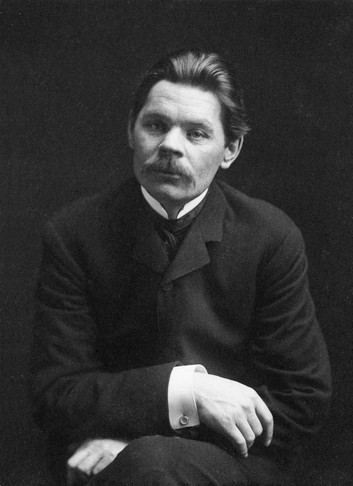In the revival of Russian literature, the name of Maxim Gorky stands at the highest pedestal. Among modern prose writers, Gorky is perhaps the only author—after Tolstoy—whose fame has reached the farthest corners of the world. His renown surpasses that of Chekhov, whose popularity was mostly confined to scholarly circles in a few nations.
Gorky’s real name was Alexei Maximovich Peshkov. His father, Maxim Peshkov, was a modest shopkeeper who later became a ship agent in Astrakhan through sheer hard work and determination. He married the daughter of Vasily Kashirin, a house painter from Nizhny Novgorod. From this union, Maxim Gorky was born on March 14, 1869. Shortly after his birth, his father took him to Astrakhan. Tragically, Gorky lost his father when he was only five years old, prompting his mother to take him back to her father’s house.
Gorky later chronicled his childhood in a moving autobiographical work, vividly portraying the figures of his tyrannical grandfather and compassionate grandmother. These character sketches were so masterfully drawn that they remain etched in the reader’s mind. As young Gorky grew older, the poverty and misery around him only deepened. His mother, according to Gorky, married “a half-witted man,” for whom he held no respect. Not long after, his mother also passed away, and his grandfather sent him away to earn a living on his own.
For almost a decade, young Gorky wandered the Russian frontiers, struggling to survive. During this time, he was forced into all kinds of degrading and difficult labor. As a boy, he apprenticed under a cobbler, then worked for a while as a kitchen hand on a steamboat on the Volga River. There, an old soldier introduced him to reading. Among the first books he read was “The Mysteries of Udolpho”. Many of the books Gorky came across at that time were filled with bloodshed and tales of heroic adventures—a style that would echo in his early writings.
At the age of fifteen, Gorky attempted to enroll in a school in Kazan, but he soon discovered that free education was not yet common. Unable to get admitted, he ended up working in a biscuit factory, an experience he later turned into one of his most powerful short stories, “Twenty-Six Men and a Girl.” In Kazan, Gorky encountered students who exposed him to revolutionary thought, planting the seeds of political consciousness in his mind. After leaving Kazan, he roamed through the plains of southeastern and eastern Russia, performing all kinds of odd jobs, and often went without food for days.
In 1890, he arrived in Nizhny Novgorod to enlist in the army but was rejected due to poor health. During this time, he found employment as a clerk for a lawyer named M.A. Lenin, whom Gorky deeply respected. He even dedicated a collection of stories to him. The lawyer encouraged his literary pursuits, but soon Gorky’s restless spirit led him away once again into the wilds of Russia.
It was during this nomadic period that Gorky took up the pen. In 1892, while working in a railway workshop in Tiflis, his first short story “Makar Chudra”—a romantic tale—was published in a local newspaper Kavkaz. It was under this story that he first signed with the pen name Gorky, meaning “bitter” in Russian. This name would soon become a literary legend, known to readers across the world.















